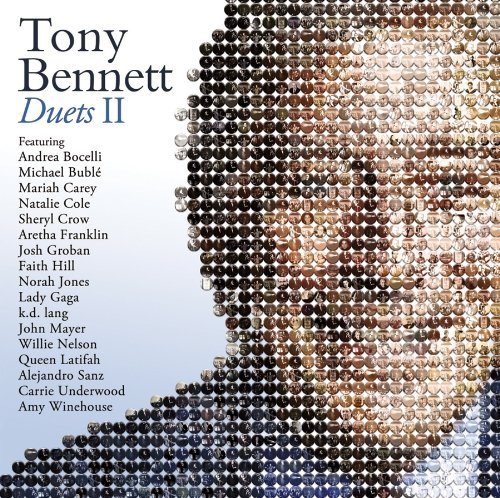Videos by American Songwriter
Tony Bennett
Duets II
(Columbia)
[Rating: 3.5 stars]
The comparison certainly isn’t an automatic one, but Tony Bennett has lived the life of a big-time rock ‘n’ roller. Think about it. He created a multi-generational standard (“I Left My Heart in San Francisco”), covered a stone-cold country hit (Hank Williams’ “Cold Cold Heart”), spent years on top before losing it all to a new music movement (thanks to the Beatles), took a brief shot at acting and wasn’t good at it (a movie you’ve never heard of), and eventually nearly died of a cocaine overdose before managing to resurrect his career to unparalleled heights. The clothes are just different, that’s all. Steven Tyler’s got nothing on this guy.
Now, at 85, Bennett is still singing great. Not quite like he was, of course – who could? – but still pretty amazingly good, even if some of his spot-on vocals might be (but probably aren’t) courtesy of his engineer son, Dae. On Duets II, Bennett picks up where he left off on the first Duets album a few years ago by inviting younger talent to share the spotlight with him on some old standards, and he doesn’t seem to just be doing it for the commercial attention. Bennett sounds sincerely grateful to be alive and to be learning from the younger generation, when it’s really him who should be teaching them.
Bennett still loves the ladies and the ladies obviously love him; of the 17 duet partners on this album, 11 are women. Duets II opens with “The Lady Is a Tramp,” a duet with – who else in this day and age? – Lady Gaga, and the two of them seem to be having a great time. Gaga takes it a little over the top, which is no surprise. The somewhat unlikely pairing of Bennett with John Mayer follows with Mayer playing the bartender’s role on “One For My Baby (And One More For the Road).”
Track three is what will be getting the most attention, though, as it may well be the last recorded performance of Amy Winehouse, who died in July. On this version of “Body and Soul,” one can almost hear Winehouse pinching herself in disbelief at being in the same room with Bennett, much less singing with him. She delivers a nice performance that does the song, and her singing partner, justice, and her potential is as obvious here as it was on everything else she recorded in her brief life.
Faith Hill, Sheryl Crow, Andrea Bocelli and Norah Jones and others appear here, and everyone does a decent enough job. Perhaps the best track on the album, though, is “On the Sunny Side of the Street,” Bennett’s duet with Willie Nelson. Nelson turns in a thoughtful performance and a nice guitar solo, paying attention to downbeat and meter in a way that he hasn’t seemed to a whole lot else he’s recorded over the past 50 years.
The charts are pretty good, though they don’t rival much of what Bennett did with Ralph Sharon decades ago, or what Nelson Riddle did with Sinatra or even Linda Ronstadt. And the engineering and recording quality are just, well, different than the old days, though Dae Bennett pays homage to his father better than anyone else might be able to. In the end, though, whether you’re a Bennett fan or a follower of one of his duet partners, this album is nothing extraordinary, and it will be a rare listener who gives this disc more than a couple curious spins before turning to something from the Bennett catalog of yesteryear.














Leave a Reply
Only members can comment. Become a member. Already a member? Log in.